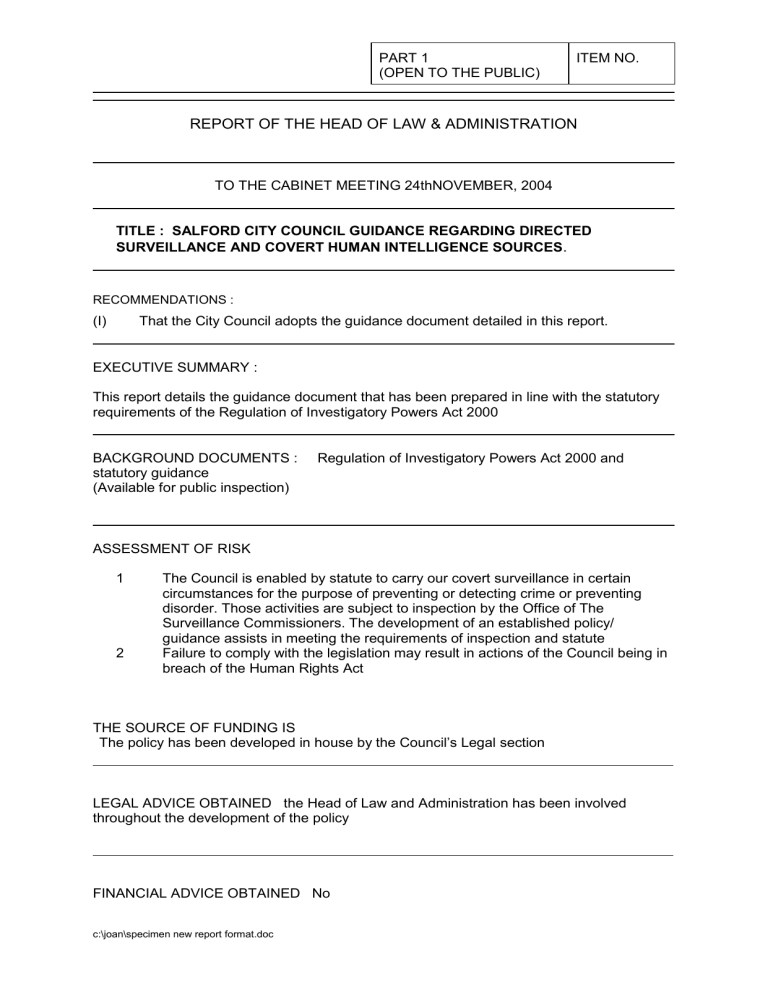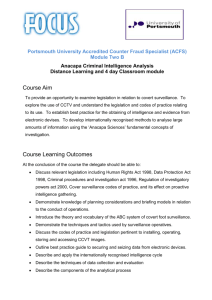REPORT OF THE HEAD OF LAW & ADMINISTRATION .

PART 1
(OPEN TO THE PUBLIC)
ITEM NO.
REPORT OF THE HEAD OF LAW & ADMINISTRATION
TO THE CABINET MEETING 24thNOVEMBER, 2004
TITLE : SALFORD CITY COUNCIL GUIDANCE REGARDING DIRECTED
SURVEILLANCE AND COVERT HUMAN INTELLIGENCE SOURCES
.
RECOMMENDATIONS :
(I) That the City Council adopts the guidance document detailed in this report.
EXECUTIVE SUMMARY :
This report details the guidance document that has been prepared in line with the statutory requirements of the Regulation of Investigatory Powers Act 2000
BACKGROUND DOCUMENTS : Regulation of Investigatory Powers Act 2000 and statutory guidance
(Available for public inspection)
ASSESSMENT OF RISK
1
2
The Council is enabled by statute to carry our covert surveillance in certain circumstances for the purpose of preventing or detecting crime or preventing disorder. Those activities are subject to inspection by the Office of The
Surveillance Commissioners. The development of an established policy/ guidance assists in meeting the requirements of inspection and statute
Failure to comply with the legislation may result in actions of the Council being in breach of the Human Rights Act
THE SOURCE OF FUNDING IS
The policy has been developed in house by the Council’s Legal section
LEGAL ADVICE OBTAINED the Head of Law and Administration has been involved throughout the development of the policy
FINANCIAL ADVICE OBTAINED No c:\joan\specimen new report format.doc
CONTACT OFFICER : Alan R Eastwood 0161 793 3000
WARD(S) TO WHICH REPORT RELATE(S) All
KEY COUNCIL POLICIES: 1. Reducing crime in Salford
DETAILS
1. The Regulation of Investigatory Powers Act 2000 sets out the statutory framework for the authorisation of covert surveillance by the council for the prevention and detection of crime and for preventing disorder. The Council has developed a general guidance document for use by all Directorates that as the basic framework on which the Council applies the provisions of The Regulation of Investigatory Powers Act
2000 (RIPA) as it relates to surveillance. It must be read in conjunction with the statutory codes of practice issued by the Secretary of State and any additional guidance provided by individual directorates to deal with the specific issues of their service. This document has been developed as a means of establishing a consistent approach across the council
2. The Guidance details:
The activities which can be authorised
the tests which must be applied regarding necessity and proportionality
the procedures for the grant, renewal, and cancellation of authorisations
3 The Guidance sets out details of who may grant authorisations, which is at least an
Assistant Director or Head of Function or equivalent, and in some circumstances is the Chief Executive only.
4 It is believed that this guidance assists in developing best practice concerning the legal implications of surveillance and should be adopted by the Council
Alan R Eastwood
Head of Law and Administration c:\joan\specimen new report format.doc



